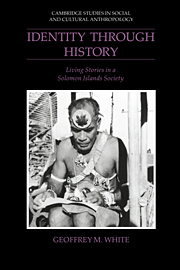Book contents
4 - Chiefs, persons and power
Published online by Cambridge University Press: 12 January 2010
Summary
Readers familiar with the anthropology of Melanesia will realize that talk of “chiefs” is anything but straightforward. Not only do most societies in the region lack formalized titles of chiefly status, but further ambiguities in the power and legitimacy of local leaders have been created by the colonial experience. The encounter with the West has produced new discourses of tradition that have made chiefs a focal point for ideological innovation. As will be seen in later chapters, local chiefs are being created and recreated in the context of modern bureaucratized forms of governance. One way of interpreting these changes is to see them as the gradual replacement of one form of polity (indigenous, personal, particularistic) with another (Western, rational, universalistic). However, I argue that such an approach presumes a unidirectional evolutionary process that misses the multiplicity of practices that contend in the contemporary political arena. It is as important to note that Western political forms are assimilated within indigenous frameworks of meaning as it is to attend to the “impacts” of colonial forces.
In this chapter I suggest that present-day chiefs are a focus for ideas about persons, power and political institutions – a site where indigenous and Western practices mutually shape one another.
- Type
- Chapter
- Information
- Identity through HistoryLiving Stories in a Solomon Islands Society, pp. 52 - 78Publisher: Cambridge University PressPrint publication year: 1991



